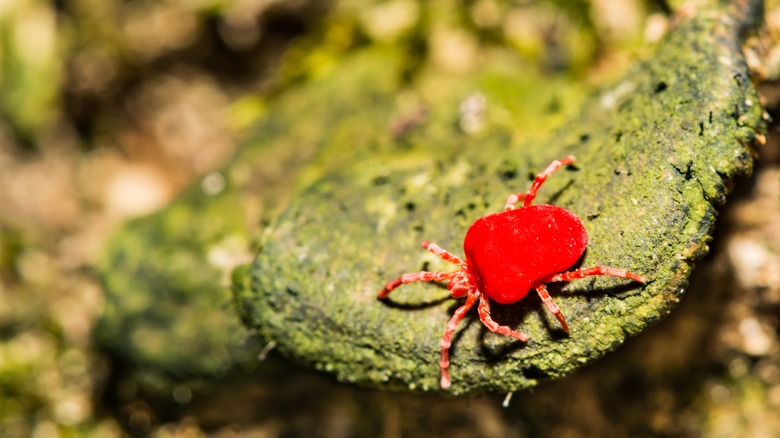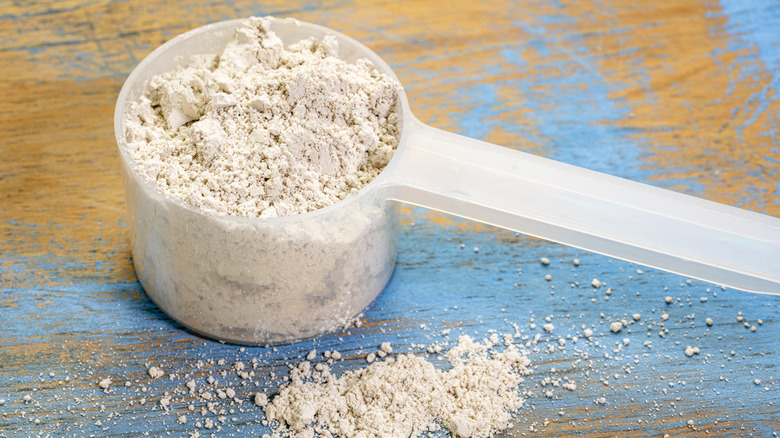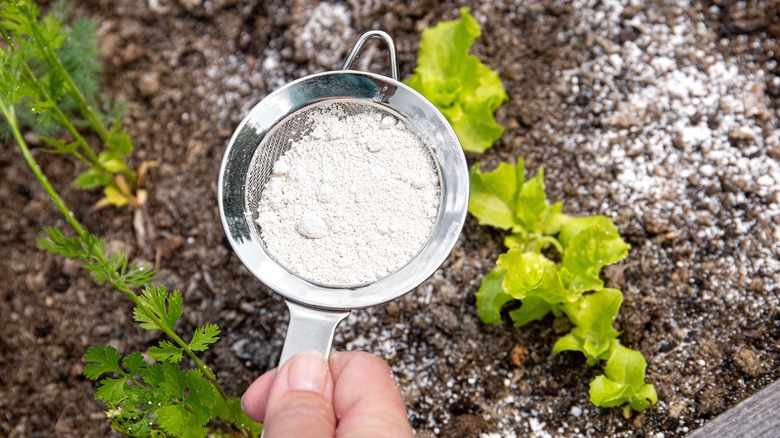The Secret Weapon You Need To Get Rid Of Chiggers In Your Yard
Chiggers are a kind of mite, and while they don't carry diseases, their bites can cause intense itching and dermatitis. They're most active in early summer when the ground temperature is just right for their development. It's not just the bites; chiggers can mar your summer days, turning gardening, barbecues, and even a simple walk across the lawn into an itch-inducing nightmare — this is where diatomaceous earth steps in. Its efficacy against chiggers arises from its ability to breach their defenses.
Diatomaceous earth (DE) is a natural, powdery substance, made from the fossilized traces of small water-dwelling creatures known as diatoms. Their silica skeletons, upon their demise, gradually formed thick layers on the beds of various water bodies. Fast-forward through time, and these layers have transformed into rich, mineable deposits. Acquiring diatomaceous earth is a breeze. You can find this powdery substance in garden centers or online, often labeled as a natural pesticide. When shopping, you'll want to look for food-grade DE, which is safe for use even if you have pets or children who love to play in the yard. DE offers a way to address your chigger problem without resorting to harsh chemicals. However, understanding these pests is the first step in reclaiming your green space.
Unraveling the efficacy of diatomaceous earth
As a natural desiccant, diatomaceous earth works on both insects and arachnids alike. It strips away the waxy layer that they depend on to retain moisture. Exposed to the elements, these pests cannot maintain the hydration necessary for their survival. The granules of DE, innocuous to the touch of larger creatures, are a minefield to the micro-world of insects. They bear countless sharp edges that can pierce the exoskeletons of chiggers. These tiny cuts further the desiccation process, depleting the insect's vital fluids. Unlike chemical pesticides, DE doesn't discriminate based on the insect's metabolism or feeding habits. Instead, its method of control is purely physical, which prevents chiggers from developing resistance — a common problem with chemical controls.
DE's ability to act without the need for toxic additives means that it maintains a yard's habitability for pets and children. It doesn't evaporate or dissolve, remaining effective as long as it stays dry. Plus, it adds to soil health by contributing to its mineral content, supporting a more robust garden ecosystem. Beyond pest control, DE's properties find utility in soil aeration and nutrient retention, which can enhance garden health. Its porous nature can help break up heavy, clay-like soils, allowing roots to breathe and water to penetrate more efficiently. In compost, DE can control odors and absorb moisture, reducing pests and speeding up decomposition.
How to use diatomaceous earth
Applying diatomaceous earth to get rid of chiggers is straightforward. For comprehensive coverage, you'll want to treat not just the obvious chigger habitats but potential entry points to your yard. Put on your gardening gloves and apply a fine layer of DE over areas where chiggers are likely to frequent — the bases of shrubs, the edges of gardens, and anywhere that offers shade and humidity. These are the spots where chiggers wait for a passing host. A light, even coverage is effective. Moreover, don't just treat the problem once and forget about it. Regular applications every few weeks, especially during the chigger season, will keep these pests at bay.
Timing also matters. Apply DE on a dry day, as moisture can clump the powder and reduce its effectiveness. Reapplication is necessary after heavy rain or watering. And remember, while DE is non-toxic, it's still a fine dust, so it's best to wear a mask to avoid inhalation and protective goggles if you have sensitive eyes. Pairing DE with good yard hygiene amplifies its efficacy. Keep your lawn mowed, your bushes trimmed, and your yard free of leaf litter. By reducing the habitat chiggers love, you decrease their numbers and make your DE barrier even more effective. Additionally, consider integrating natural predators into your landscape. Birds and certain insect species feed on chiggers, which can help maintain a balanced ecosystem in your yard.


